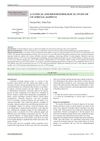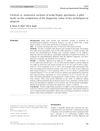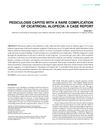
The document concludes that most hair loss treatments don't work, balding isn't caused by dandruff, and hair loss may indicate serious health issues that require medical attention.

Hair loss should be medically treated, as non-medical treatments are ineffective and hair loss can indicate serious health issues.

Hair loss in African American women, caused by hair care, genetics, and environment, needs more research for better treatment.
 November 1999 in “Journal of Cutaneous Medicine and Surgery”
November 1999 in “Journal of Cutaneous Medicine and Surgery” Treatments for hair loss include hormone modifiers, minoxidil, and hair transplant surgery.
 37 citations,
December 2007 in “International journal of clinical practice”
37 citations,
December 2007 in “International journal of clinical practice” Hirsutism is excessive male-pattern hair growth in women, often caused by hormonal imbalances, and requires ongoing treatment to manage.
 29 citations,
February 2017 in “International Journal of Women's Dermatology”
29 citations,
February 2017 in “International Journal of Women's Dermatology” Women with excessive male-pattern hair growth should get a full hormone check-up to find and treat any underlying issues, considering both medical and emotional aspects.
 16 citations,
September 2018 in “Journal of Ethnopharmacology”
16 citations,
September 2018 in “Journal of Ethnopharmacology” Plant-based remedies may treat hair loss by reducing inflammation and improving insulin resistance.
 9 citations,
April 2018 in “JAMA Dermatology”
9 citations,
April 2018 in “JAMA Dermatology” Topical minoxidil improves hair loss in 80% of women with breast cancer undergoing endocrine therapy.
 9 citations,
March 2017 in “Dermatologic Surgery”
9 citations,
March 2017 in “Dermatologic Surgery” Asian men with hair loss have different follicular densities: East/Southeast 61.1, South 63.5, West 63.6 FU/cm².
 5 citations,
July 2013 in “Our Dermatology Online”
5 citations,
July 2013 in “Our Dermatology Online” Lichen planopilaris is the most common type of scarring hair loss observed, with a variety of symptoms and tissue changes.
 4 citations,
January 2022 in “Skin appendage disorders”
4 citations,
January 2022 in “Skin appendage disorders” Oral minoxidil may effectively treat hair loss from chemotherapy.
 4 citations,
April 2014 in “Journal of Pharmacology and Pharmacotherapeutics”
4 citations,
April 2014 in “Journal of Pharmacology and Pharmacotherapeutics” The boy's hair loss was caused by the tuberculosis drug isoniazid but grew back after stopping the medication.
 2 citations,
December 2019 in “Veterinary Dermatology”
2 citations,
December 2019 in “Veterinary Dermatology” Microneedling with platelet-rich plasma helps dog hair regrow faster than microneedling alone.
 November 2022 in “The Indian journal of chest diseases & allied sciences”
November 2022 in “The Indian journal of chest diseases & allied sciences” Isoniazid can rarely cause hair loss, which is reversible after stopping the drug.
 69 citations,
December 2015 in “Journal of Controlled Release”
69 citations,
December 2015 in “Journal of Controlled Release” Nanocapsules can improve clobetasol delivery to hair follicles, reducing side effects.
 67 citations,
April 2007 in “Journal der Deutschen Dermatologischen Gesellschaft”
67 citations,
April 2007 in “Journal der Deutschen Dermatologischen Gesellschaft” Shampoos are designed to clean and improve hair and scalp health, with specific ingredients for different hair types and conditions.
 50 citations,
March 2000 in “American Journal of Clinical Dermatology”
50 citations,
March 2000 in “American Journal of Clinical Dermatology” Alopecia Areata has no guaranteed treatment for hair regrowth, but options like corticosteroids and minoxidil are used, with future research focusing on genetic and immune therapies.
 28 citations,
August 2018 in “Dermatologic Clinics”
28 citations,
August 2018 in “Dermatologic Clinics” Trichoscopy is a useful tool for diagnosing hair and scalp issues, but doctors must be careful to avoid mistakes.
 19 citations,
September 2011 in “Clinical and Experimental Dermatology”
19 citations,
September 2011 in “Clinical and Experimental Dermatology” Transverse scalp sections are better for diagnosing non-scarring hair loss, while vertical sections are better for a specific scarring hair loss called lichen planopilaris.
 2 citations,
January 2023 in “Pharmaceuticals”
2 citations,
January 2023 in “Pharmaceuticals” Natural products and phytochemicals may help with hair regrowth, but more research is needed.
 2 citations,
August 2020 in “International Journal of Cosmetic Science”
2 citations,
August 2020 in “International Journal of Cosmetic Science” Lindera strychnifolia root extract may help balance scalp bacteria and potentially reduce hair loss.
 2 citations,
January 2018 in “DOAJ (DOAJ: Directory of Open Access Journals)”
2 citations,
January 2018 in “DOAJ (DOAJ: Directory of Open Access Journals)” The most effective way to diagnose non-scarring hair loss is by transverse sectioning, and some cases, particularly in males with inflammation around hair follicles, might be curable.
 February 2024 in “International journal of biology, pharmacy and allied sciences”
February 2024 in “International journal of biology, pharmacy and allied sciences” Plant-based treatments can effectively and safely treat hair loss.
 September 2022 in “International journal of pharmaceutical quality assurance”
September 2022 in “International journal of pharmaceutical quality assurance” The herbal shampoo is less damaging and improves hair's appearance.
 271 citations,
December 2005 in “New England journal of medicine/The New England journal of medicine”
271 citations,
December 2005 in “New England journal of medicine/The New England journal of medicine” The document likely offers guidance on treating a woman's excessive hair growth, considering her symptoms and obesity.
 25 citations,
December 2017 in “The Journal of Clinical Endocrinology & Metabolism”
25 citations,
December 2017 in “The Journal of Clinical Endocrinology & Metabolism” Birth control pills combined with bicalutamide are more effective at reducing excessive hair growth in women with PCOS than birth control pills alone.
 16 citations,
January 2017 in “Anais brasileiros de dermatologia/Anais Brasileiros de Dermatologia”
16 citations,
January 2017 in “Anais brasileiros de dermatologia/Anais Brasileiros de Dermatologia” Managing frontal fibrosing alopecia and lichen planus pigmentosus is challenging due to resistant hair loss and skin discoloration.
 7 citations,
January 2018 in “Medicinski arhiv”
7 citations,
January 2018 in “Medicinski arhiv” A herbal extract may help treat certain types of hair loss by reducing a specific gene's activity.
 5 citations,
June 2015 in “International Journal of Women's Dermatology”
5 citations,
June 2015 in “International Journal of Women's Dermatology” Hirsutism, excessive hair growth in women, is often caused by PCOS and can be managed with medication and personalized treatment plans.
 January 2018 in “International Journal of Medical Reviews and Case Reports”
January 2018 in “International Journal of Medical Reviews and Case Reports” A 6-year-old girl with head lice developed scarring hair loss but improved with treatment.






























